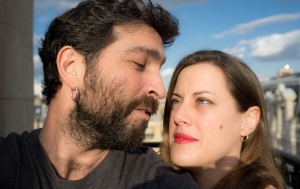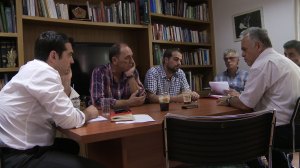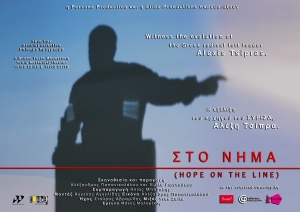How did you approach your main character?
Hope on the line is an observational documentary without commentary. The content approach is direct and tells the story from the inside. We had exclusive access to Alexis Tsipras’s daily schedule.
The main aim of this documentary is to remain close to the character at all times. We tried, and believe we managed, to quickly gain his trust in order to create an honest and fair portrait. We wanted to have a successful portrait of his personality, so we initially tried to make ourselves “invisible” to the campaign team. Alexis Tsipras and his officials were not at all distrustful and did not hesitate to open their doors and let us into the core of the party.
We followed him throughout the campaign, right up until the final results. We have tried to reveal his personality by following him closely, listening to his speeches, meeting his friends, relatives and colleagues, but also by filming him in contact with voters. Each day we added more brushstrokes to his portrait in a bid to understand his goals and motivations.
By observing only one candidate in these elections and then his rise to the position of main opposition leader, we tried, with the aid of several events that occurred during shooting, to highlight the current state of democracy in Greece and feel the pulse of Greek society.

How did you manage to get behind the surface of the public person?
This was the challenging part because from the beginning it was clear with Alexis that we could do this documentary by filming him at work only. He didn't want us to film him with his family and we respected that. Accepting to do this documentary was tricky for him too. So we tried to film him as if we filmed any other person at work and focused on Tsipras the political person. We also asked him unconventional questins, more about his personal beliefs or about his past, rather than on current political issues.

Are you satisfied with the way Alexis Tsipras is portrayed in the media (Greek and international)? Would you want to change that?
To be satisfied or not with the image of Alexis Tsipras in the media is not a question that we really ask ourselves - that is how the world functions. We are more interested in how the political system functions in our society. We are not image makers and we don't aim to change the course of things. We did this documentary because we wanted answers to our questions, even if in the end new questions come along. We think that the political situation in Greece makes the whole political picture even more dramatic. This makes sense because the situation is very tense, with big changes, scandals and injustice. Public opinion, the media and other countries are sceptical about all Greek politicians, not only Alexis Tsipras, and this is reflected in his image in the media.
What is he really like?
He is really friendly as a person. Also, without knowing us at all, he accepted our proposition to do this documentary and kept his word that he wouldn't interfere in the final cut, and that he would give us access to his office. He seems confident and calm, and is not afraid of his image, even when most of the media are punching him.
On the other hand, we won't make any comment on the politician, that's for the documentary audience to decide.
What was the challenge for you telling this story?
The challenge was that this doc is a portrait, but it's also the portrait of a politician. When you make a portrait of someone, you need to be fair with what you see and with the person that accepted you to film them. You need also to get closer to this person, and try to understand their way of thinking, even when you don't always agree. Then, when you do a documentary involving current affairs and politics, it gets tricky to balance the proximity you have with the person you film and the observational part filming the politician.
What was also challenging was to show the general feeling of a complicated period for Greece from the perspective of the offices of a political party during an election campaign.
How did you approach co-directing the film?
We are used to working together for years now; our experiences are common experiences. When we start a new project, with new challenges, we try to remember our past experiences and to go on. We discuss a lot about what we can expect. As independent directors and producers, we work together all along a project, from early writing until the end of post-production.
How did you work visually?
The conditions were not ideal because we had to work as a very small team. It was challenging to try to be creative at all times in these conditions. We tried to do nice outdoor images and close portraits in indoor scenes.
Could you give us some details about the production?
We started the production on our own. Then we did a rough cut with the help of our editor, Angelos Angelidis, who was selected with it at Berlinale's Talent Campus. We were thrilled! Angelos is a great editor, calm and wise. His mentor at Berlinale was touched by the work Angelos did on our doc. Then we found a co-producer, Ilias Bovalis, at the Thessaloniki Documentary Festival. He was very exited about our project and for that we thank him because we needed the support. It's always nice to find people who believe in your project and that can help you to continue to work on it. Finally we got the support of the French script fund SCAM.

The film premiers at the Thessaloniki International Documentary Festival "Images of the 21st Century", Tonia Marketaki Cinema Theatre, 16/03/2014 at 20.00 and 18/03/2014 at 22.30.
CREDITS
Production: Persona Production (France)
Co-Production : Elibo Productions (Greece)
Script, Direction and Production:
Alexandros Papanikolaou & Emily Giannoukou
Co-Producer: Ilias Bovalis
Editing: Aggelos Aggelidakis
Camera: Alexandros Papanikolaou
Sound: Stavros Avramidis
Research: Makis Malafekas
PERSONA PRODUCTION
Persona production
http://www.facebook.com/personaprod
http://www.youtube.com/personaproduction




